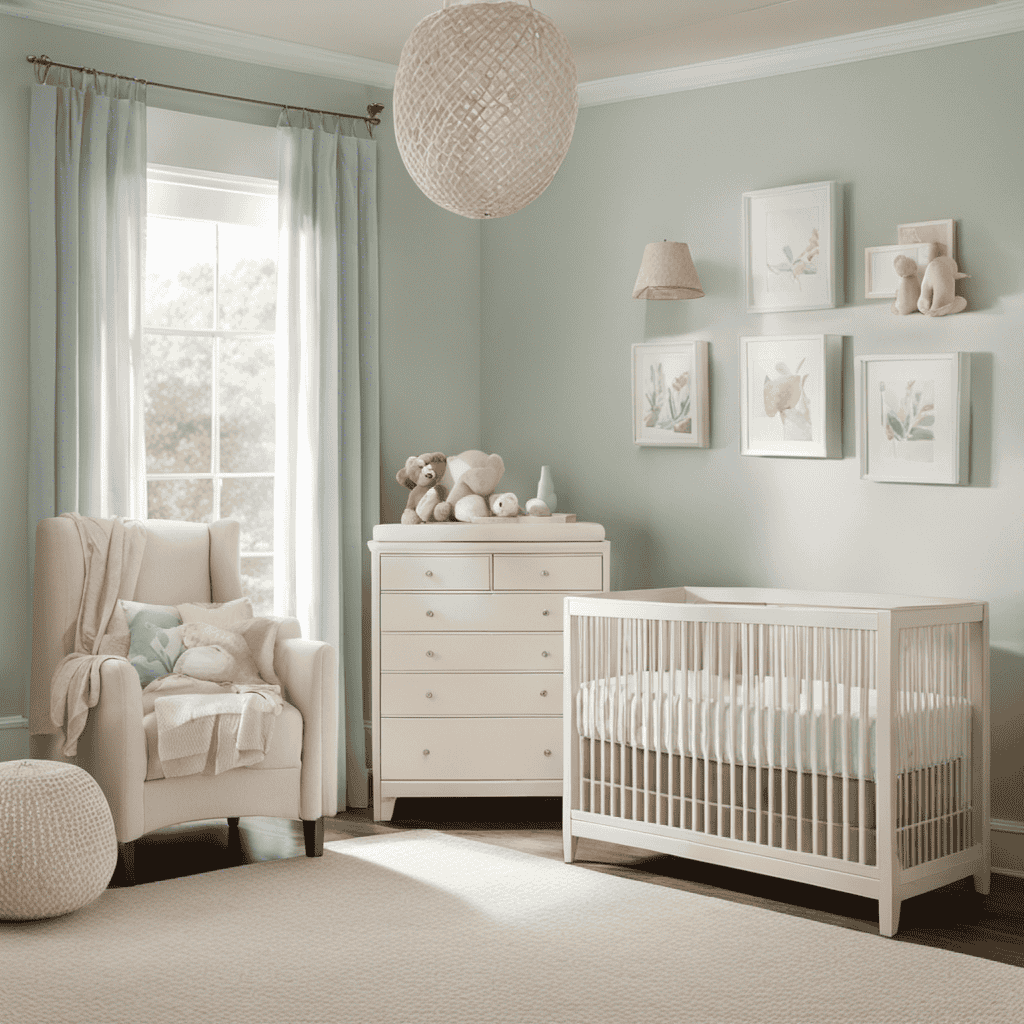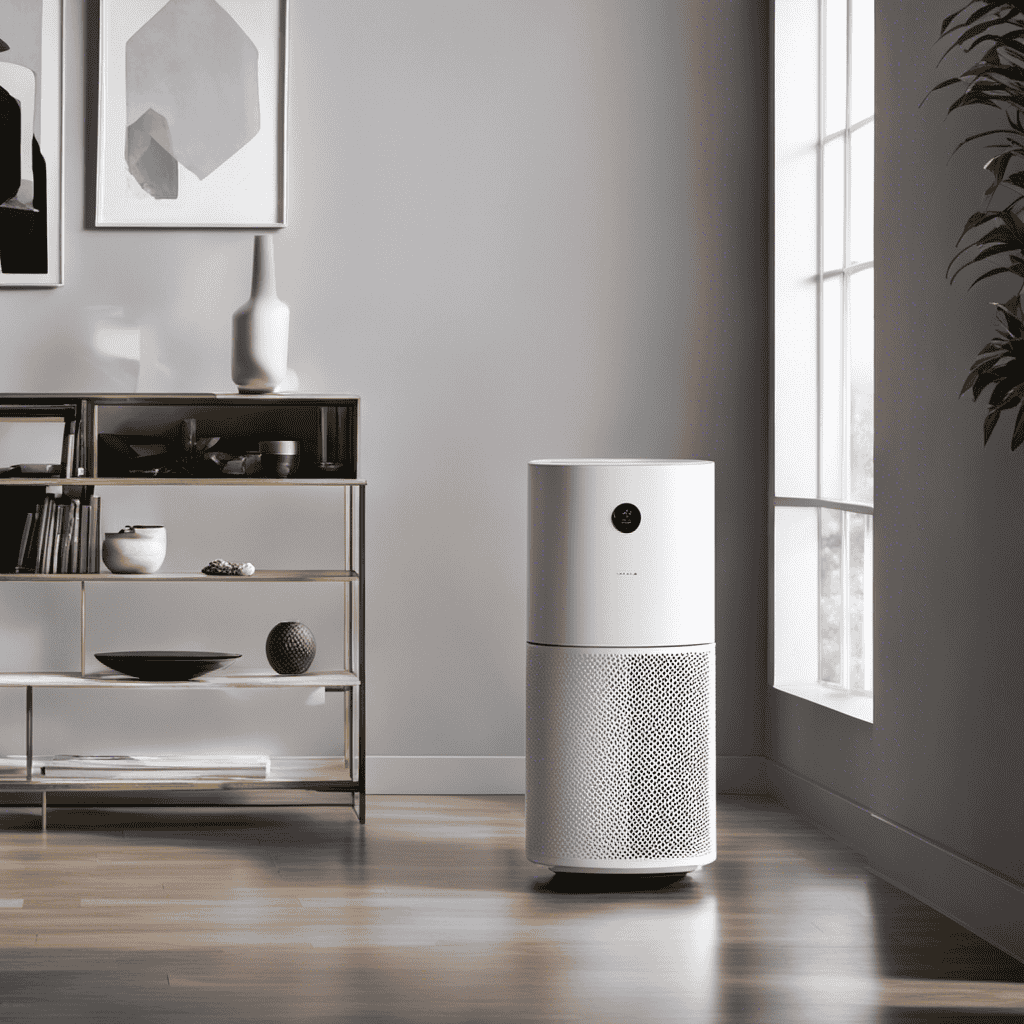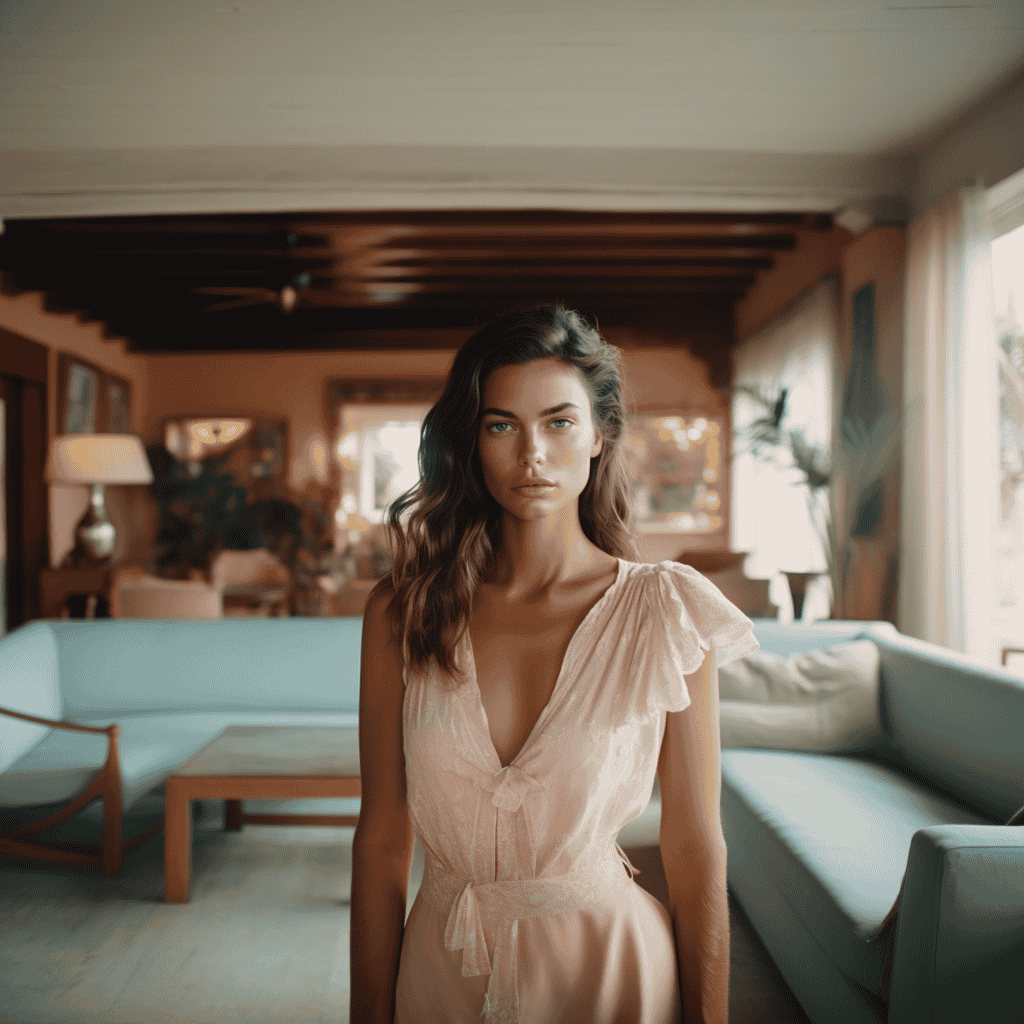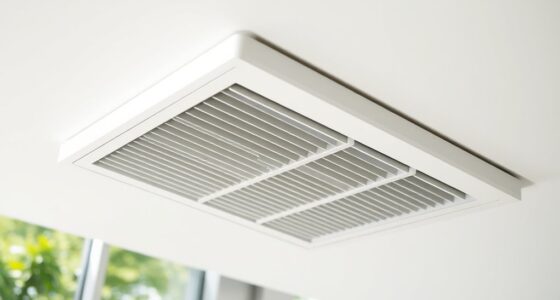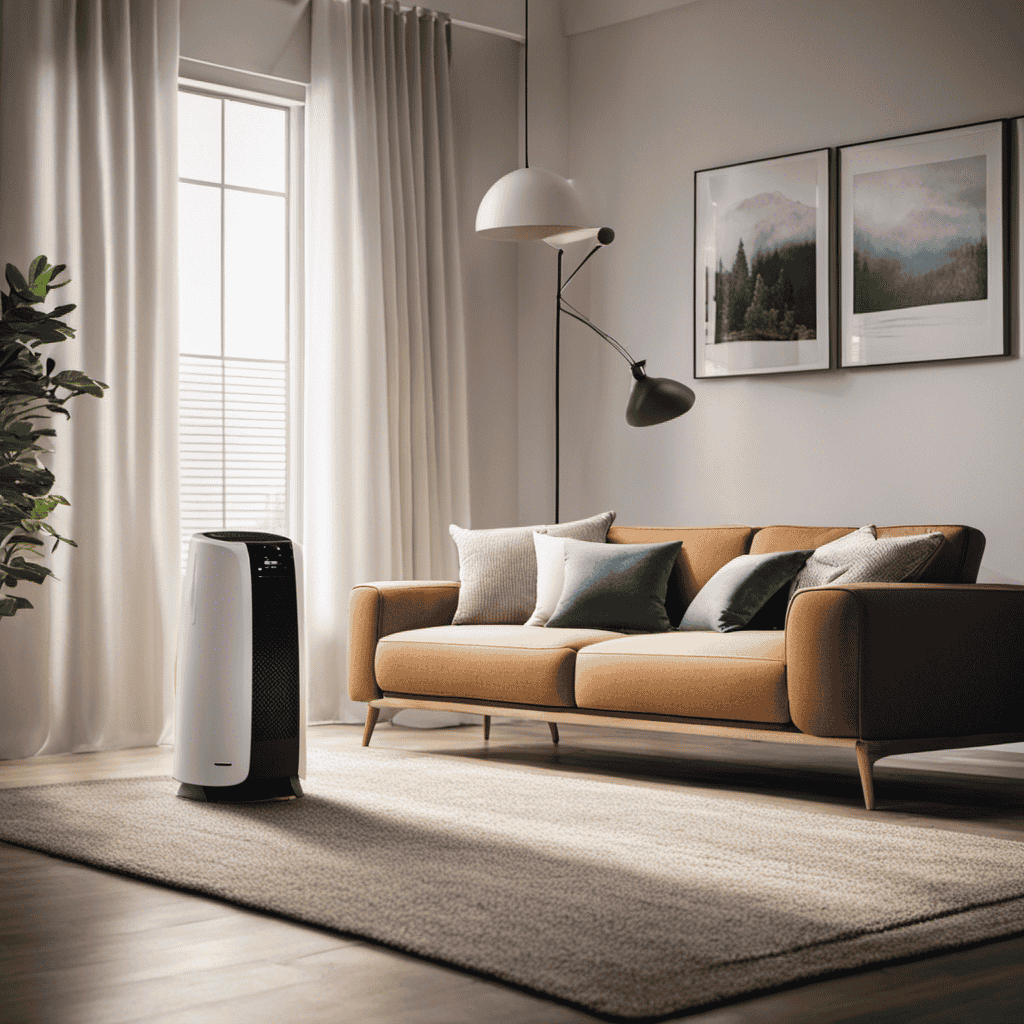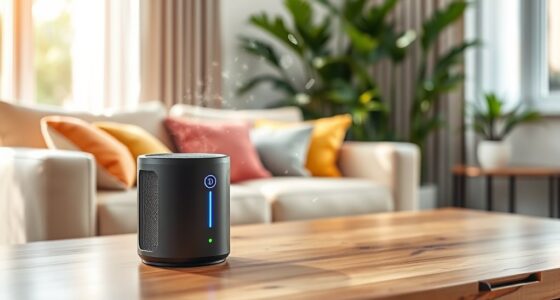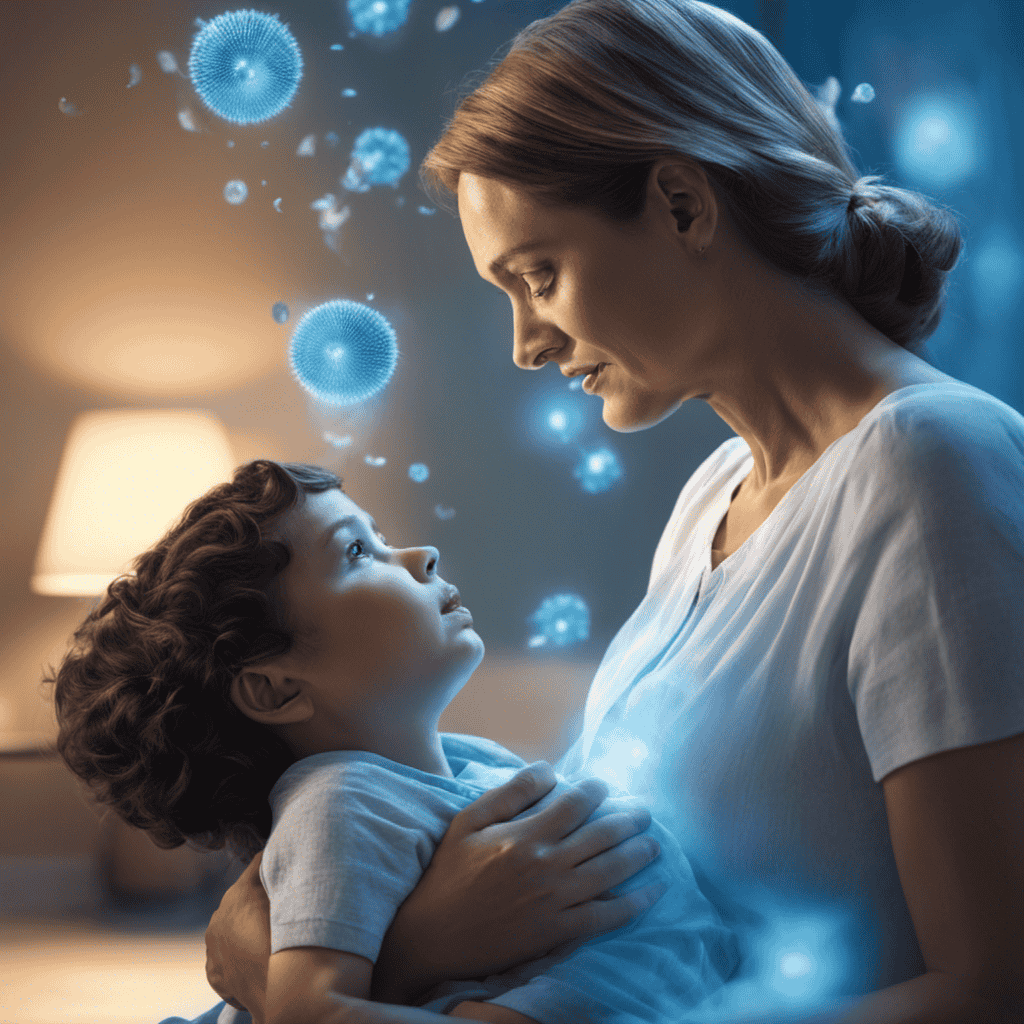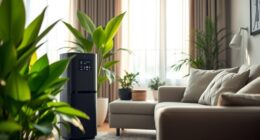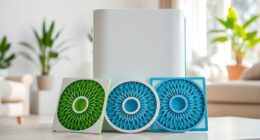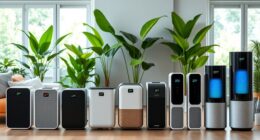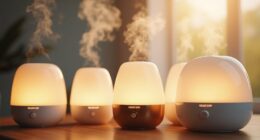As a parent, I understand that our primary concern is the health and well-being of our children. Regarding the air they inhale, we seek only the highest quality.
That’s why I’m here to share with you the best air purifiers for babies. These devices not only remove harmful pollutants from the air, but they also create a clean and healthy environment for your little bundle of joy.
So let’s dive in and find the perfect air purifier for your baby’s needs.
Key Takeaways
- Research different air purifier brands for reliability and effectiveness
- Consider the price range of air purifiers to find a balance between quality and affordability
- Air purifiers remove harmful particles and pollutants from the air, creating a clean and healthy breathing environment for babies
- Air purifiers with HEPA filters can greatly reduce allergens in the baby’s environment, promoting better respiratory health and improved sleep quality for babies.
Key Factors to Consider
When looking for the best air purifier for your baby, you’ll want to consider a few key factors.
First, it’s important to research different air purifier brands to find the most reliable and effective options. Look for brands that have a good reputation and positive customer reviews, as this indicates their reliability and performance.
Additionally, consider the price range of the air purifiers you are considering. While it’s natural to want the best for your baby, it’s important to find a balance between quality and affordability. There are many air purifiers available at various price points, so it’s possible to find one that fits within your budget while still providing excellent air filtration for your little one.
Importance of Air Purifiers for Babies
When it comes to creating a safe breathing environment for babies, air purifiers play a crucial role. They help remove harmful particles and pollutants from the air, ensuring that your little one breathes in clean and fresh air.
Additionally, air purifiers can also provide allergen reduction benefits by capturing allergens like dust mites, pet dander, and pollen, which can trigger allergies and respiratory issues in babies.
This, in turn, can lead to improved sleep quality for your baby, as they won’t be constantly bothered by allergies or breathing difficulties during the night.
Safe Breathing Environment
To ensure a safe breathing environment for your baby, it’s important to choose the best air purifier. Air purifiers are highly effective in improving air quality by removing harmful particles and allergens from the air.
Studies have shown that air purifiers can significantly reduce indoor air pollutants such as dust, pet dander, pollen, and mold spores. These pollutants can trigger respiratory issues and allergies in babies, so it’s crucial to create a clean and healthy atmosphere for them to grow and develop.
Allergen Reduction Benefits
Investing in an air purifier with HEPA filters can greatly reduce allergens in your baby’s environment, promoting better respiratory health and a more comfortable living space. HEPA filters are designed to capture 99.97% of particles as small as 0.3 microns, including dust mites, pollen, pet dander, and mold spores.
These key features make them highly effective in improving air quality and reducing allergic reactions. When choosing an air purifier for your baby, look for models that have multiple filter types, such as activated carbon filters, which can remove odors and harmful gases.
Additionally, consider the size of the purifier to ensure it can adequately clean the room where your baby spends the most time. By investing in an air purifier with HEPA filters, you can create a safe and healthy environment for your little one.
Improved Sleep Quality
Using an air purifier with HEPA filters can lead to better sleep quality for your little one. It’s important to prioritize your baby’s respiratory health, especially during sleep, as they are more vulnerable to environmental pollutants.
HEPA filters are designed to capture tiny particles, such as dust mites, pet dander, and pollen, that can trigger allergies and respiratory issues. By reducing these allergens in the air, an air purifier can help improve your baby’s respiratory health, making it easier for them to breathe and reducing the likelihood of nighttime coughing.
This can result in a more restful sleep for your little one, allowing them to wake up refreshed and ready for the day. Investing in an air purifier with HEPA filters is a proactive step towards creating a cleaner and healthier sleep environment for your baby.
Top Features to Look for in an Air Purifier
When choosing an air purifier, there are two key features to consider for children: filter effectiveness for allergies and noise level for sleep.
The filter effectiveness is important for removing allergens such as pollen, dust mites, and pet dander from the air, which can help alleviate allergy symptoms.
Additionally, a quiet noise level is crucial for a good night’s sleep, ensuring that children are not disturbed by the purifier while resting.
Filter Effectiveness for Allergies
Filter effectiveness can greatly reduce allergy symptoms in babies. When choosing an air purifier for your little one, it is important to consider the filter’s efficiency in removing allergens from the air.
Look for reputable air purifier brands that are known for their effective filtration systems. HEPA filters, for example, are highly recommended for trapping allergens like dust mites, pet dander, and pollen. These filters can capture particles as small as 0.3 microns, ensuring cleaner and healthier air for your baby.
While cost considerations are important, it is crucial not to compromise on filter effectiveness. Investing in a high-quality air purifier with a reliable filtration system can provide long-term benefits for your baby’s respiratory health and overall well-being.
Noise Level for Sleep
The noise level of an air purifier can affect the quality of sleep. For babies, a quiet environment is crucial for a restful sleep. That’s why it’s important to consider the noise level of an air purifier when choosing one for your little one’s nursery. Some air purifiers also function as sound machines, producing soothing white noise that can help babies fall asleep and stay asleep.
To help you make an informed decision, here’s a comparison table of some popular air purifiers for babies:
| Air Purifier | Noise Level |
|---|---|
| Brand A | Low |
| Brand B | Medium |
| Brand C | High |
| Brand D | Low |
As you can see, different air purifiers have different noise levels. It’s important to find the right balance between a quiet sleep environment and effective air purification.
Now that we understand the impact of noise on sleep, let’s explore the best air purifiers for allergies and asthma.
Best Air Purifiers for Allergies and Asthma
If you have allergies or asthma, you should consider the best air purifiers for your needs. Air purifiers can be especially beneficial for babies as they have developing immune systems and are more susceptible to respiratory issues.
These devices help remove allergens and irritants from the air, creating a cleaner and healthier environment for your little one. When choosing an air purifier for your baby’s room, look for one with a HEPA filter, as it can effectively capture tiny particles like pet dander, pollen, and dust mites.
Additionally, consider air purifiers that have a quiet operation, so it won’t disturb your baby’s sleep. Some recommended air purifiers for pets are the Dyson Pure Cool Link, Rabbit Air MinusA2, and Winix HR900. These models not only filter out pet hair and dander but also help eliminate odors.
Noise Levels and Sleep Considerations
Consider air purifiers that operate quietly to ensure a peaceful sleep environment. When choosing an air purifier for your baby’s room, it is important to take into account the noise levels and how they may affect your little one’s sleep quality.
Here are a few things to consider:
- Look for air purifiers with a low decibel rating, preferably below 50 dB, to minimize any disruptive noise during sleep.
- Opt for purifiers with a sleep mode or night mode, which typically operate at a lower fan speed and produce less noise.
- Consider air purifiers with adjustable fan speeds, allowing you to customize the noise level based on your baby’s preferences.
By selecting a quiet air purifier, you can create a soothing environment that promotes better sleep quality for your baby.
Now, let’s explore the importance of maintenance and filter replacement in ensuring the effectiveness of your air purifier.
Maintenance and Filter Replacement
When choosing an air purifier, it’s important to regularly maintain and replace the filters to ensure its effectiveness. Proper maintenance not only extends the lifespan of the device, but also helps to keep the air clean and healthy for your little one. Here are some maintenance tips and a troubleshooting guide to help you keep your air purifier in top condition:
| Maintenance Tips | Troubleshooting Guide |
|---|---|
| Regularly clean the exterior of the purifier with a damp cloth | If the purifier is not turning on, check if it’s properly plugged in |
| Change the filters as recommended by the manufacturer | If the purifier is making unusual noises, check for loose parts |
| Vacuum or wipe the filters every month to remove dust and debris | If the air quality doesn’t improve, consider replacing the filters |
Important Safety Features to Consider
One important safety feature to check for is a child lock on the air purifier. This ensures that curious little hands won’t be able to tamper with the settings or accidentally turn off the purifier.
When it comes to air purifier safety for babies, there are a few other key features to consider:
-
Filter quality: Look for a purifier with a high-efficiency particulate air (HEPA) filter. This type of filter is highly effective at capturing tiny particles, such as dust mites, pollen, and pet dander, which can trigger respiratory issues in babies.
-
Noise level: Opt for a purifier that operates quietly, especially during your baby’s nap or bedtime. A noisy purifier may disturb their sleep and cause unnecessary stress.
-
Indicator lights: Some purifiers have indicator lights that alert you when it’s time to replace the filter. This feature ensures that the purifier is always running at its optimal efficiency, promoting better air quality for your baby.
Ensuring the safety of your baby’s respiratory health is crucial, and investing in a reliable air purifier with these features will provide peace of mind.
– Is the Best Air Purifier for the Bedroom also Safe for Babies?
Yes, the best air purifier for bedroom is safe for babies. These purifiers are designed to remove allergens, dust, and pollutants from the air, creating a healthier environment for everyone, including babies. Look for a purifier with HEPA filtration to ensure the best air quality for your baby’s room.
Frequently Asked Questions
Can Air Purifiers Completely Eliminate All Allergens and Pollutants in a Baby’s Room?
Air purifiers can help reduce allergens and pollutants in a baby’s room, but they may not completely eliminate them. It’s important to choose a purifier that targets common allergens and has a high-efficiency particulate air (HEPA) filter.
How Long Does It Take for an Air Purifier to Effectively Clean the Air in a Baby’s Room?
It’s important to consider the effectiveness of air purifiers for a baby’s sleep quality and respiratory health. I’ll discuss how long it takes for an air purifier to clean the air in a baby’s room.
Are There Any Specific Air Purifiers Recommended for Newborn Babies?
There are specific air purifier models that are recommended for newborn babies. Using air purifiers in a baby’s room can provide numerous benefits, such as removing airborne pollutants and allergens, creating a cleaner and healthier environment for the baby.
Can Air Purifiers Help Reduce the Risk of Sudden Infant Death Syndrome (Sids)?
Air purifiers can improve respiratory health for babies, promoting better sleep quality. They may also help reduce the risk of SIDS. Using air purifiers creates a cleaner and safer environment for little ones.
Are There Any Potential Health Risks Associated With Using Air Purifiers in a Baby’s Room?
Using air purifiers in a baby’s room may have potential side effects and safety concerns. It’s important to choose a purifier with a HEPA filter and avoid ozone-generating models to ensure the health and safety of your baby.
Conclusion
In conclusion, choosing the best air purifier for your baby is like finding a magical shield that protects them from invisible dangers.
Just as a knight protects their kingdom, an air purifier shields your little one from harmful allergens and pollutants.
By considering key factors like filtration efficiency, noise levels, and safety features, you can ensure a safe and healthy environment for your child.
So, embark on this quest, armed with knowledge and a desire to provide the best for your baby, and let the air purifier be your trusty companion in this noble endeavor.
